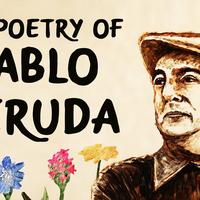Romance and revolution: the poetry of Pablo Neruda - Ilan Stavans
Pablo Neruda published his first collection of poems at age 19.
He went on to win the Nobel Prize in Literature—
and also rescue 2,000 refugees,
spend three years in political exile,
and run for president of Chile.
A romantic and a revolutionary,
Neruda was one of the most celebrated poets of the 20th century,
but also one of the most accessible and controversial.
Originally written in Spanish,
his poems often use straightforward language and everyday experience
to create lasting impact.
Neruda was born Ricardo Eliezer Neftalí Reyes Basoalto
in a small Chilean town in 1904.
His father didn't want him to be a poet,
so at sixteen he began to write under the pen name “Pablo Neruda.”
The poems in his early collection "Twenty Love Poems and a Song of Despair"
were tender and perceptive,
illuminating the subtleties of love and enchantment.
In "Poem VI," for example, he writes:
“Tu recuerdo es de luz, de humo, de estanque en calma!/
Más allá de tus ojos ardían los crepúsculos.”
Later, he poured this attention to detail into poems of appreciation
for everyday objects.
Many of the 225 short poems in his collection "All the Odes"
are dedicated to the assortment of small,
apparently insignificant items that surround us,
from a pair of shoelaces to a watermelon.
An onion is más hermosa que un ave/ de plumas cegadoras,
while a tuna in the market is a bala del profundo/
océano, proyectil natatorio, te vi, muerto.
Despite this early literary success,
Neruda struggled financially,
and took a series of diplomatic jobs in places such as Burma, Indonesia,
Singapore and Spain.
In 1936, while Neruda was working at the consulate in Madrid,
civil war broke out
and the government was overthrown by a fascist military dictatorship.
Neruda organized an evacuation of refugees from Spain to Chile,
saving 2,000 lives.
Over a period of twenty years,
Neruda captured his experiences abroad in a three volume poetry collection
titled "Residence on Earth."
Many of these poems were experimental and surreal,
merging epic landscapes, supernatural themes,
and feelings of longing with discussion of political strife
and a poet's responsibility to speak out against injustice.
In “I Explain a Few Things”
he lingers on haunting details of the destruction of the Spanish Civil War.
For the rest of his life,
Neruda remained committed to revolutionary ideals.
His politics led to several years of exile
before he was able to return to Chile in 1952.
While in exile,
he published his influential "Canto General."
The book attempts to retell the entire history of Latin America through poetry,
touching on everything from its flora and fauna
to its politics and wars,
but above all paying homage to the common people
behind its civilizations' achievements.
Although he continued to travel,
after returning from exile
Neruda lived in Chile for the rest of his life.
In 1970, at age 66,
Neruda ran for president of Chile before yielding to Salvador Allende
and becoming his close advisor.
But in 1973, Allende was overthrown in a military coup by General Augusto Pinochet.
Neruda died in the hospital a couple of weeks later.
Because of the timing of his death so soon after the coup,
rumors swirled that he had died of sadness or even been assassinated,
but the hospital recorded his cause of death as cancer.
Today, Neruda's lines are recited at protests and marches worldwide.
Much like his life,
Neruda's poems bridged romance and revolution
by emphasizing the everyday moments worth fighting for.

